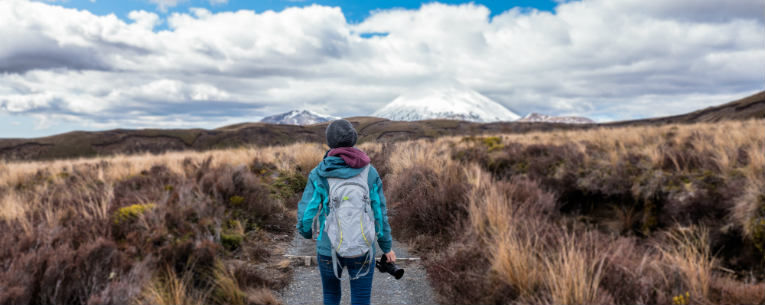Travel opens your eyes to the incredible beauty of the Earth. Once you’ve seen the Amazon rainforest, the coral reefs of Belize, or the wildlife of the African savanna, you truly understand why it’s so important to save these precious places.
But travel is also bad for the Earth. Not just a little bad; really bad. The carbon emissions from flying or driving, the destruction of wilderness for resorts and roads, and the trash generated by tourism are all serious problems that travelers can’t ignore.
What can a conscientious traveler do? While true zero-waste travel is difficult, it is possible to make choices that minimize your environmental impact and even benefit your destination.
Sustainable Travel Tips: Transportation
“Minute by minute, mile by mile, nothing that we do causes greater or more easily avoidable harm to the environment than flying,” noted MacArthur Genius Grant recipient Jack Miles.i A trip he took with his wife to Morocco from Los Angeles released about 16,800 pounds of carbon dioxide (that’s just the two seats, not the whole plane). This single trip’s impact equaled more than half of his family’s annual carbon footprint. “The harm we did with one international trip surely neutralized any good that we did all year as recyclers, eco-consumers and financial contributors to environmental organizations,” Miles wrote.
That’s tough for frequent travelers to hear. So what can you do to make your travel more sustainable?
- Take one long international trip instead of several short ones. If possible, save your money and your vacation time so that you can combine planned jaunts into one grand journey. That way, your carbon output is reduced. (Just don’t forget to safeguard that investment with travel insurance!)
- Say no to unnecessary trips. It’s perfectly fine to decline that destination wedding or family vacation you don’t really want to be a part of.
- Travel domestically. You could spend your entire lifetime traveling the United States and still never see all its wonders: historic towns, glittering cities, sunny beaches, and untouched wilderness. To further reduce your impact, you can rent an electric or hybrid car for your great American road trip. The Rental Car Damage Protector can save you a lot of money at the rental counter — find out how.
- Purchase carbon offsets. To reduce the climate impact of an international flight, you can purchase carbon offsets. This means you’re investing in an effort, such as tree-planting or wind energy, that will reduce carbon emissions another way.
- Choose the train. Train travel is more sustainable than flying or driving. And in some instances, it may even be quicker than taking a plane. Read more: 5 U.S. Routes Where the Train Beats the Plane
- Research your cruise line. Cruise ships are heavy polluters, and not all lines have the same practices when it comes to emissions and sewage treatment. Check your favorite cruise line’s environmental score before booking.
- Plan a cycling trip. Bicycling is the most sustainable mode of travel (besides walking), and opportunities abound for unforgettable adventures. Read more: 5 Awesome Biking Vacations
Sustainable Travel Tips: Packing
Well-prepared travelers can lighten their travel impact by carrying durable goods for the journey. And remember, there’s one thing you can pack that protects you in even the remotest destinations: travel insurance from Allianz Global Assistance, the trusted choice for more than 55 million travelers each year. Get a quote for your next trip .
- Carry alternatives to single-use plastics. It’s a lot easier to say no to packaged snacks and disposable utensils when you’re carrying sustainable alternatives. We like these packing tips from Going Zero Waste: Bring a reusable water bottle, cloth napkins, steel tiffin containers, your own snacks and a reusable quart-sized bag for bringing liquids through security. Other things to pack: a cloth shopping bag and a metal coffee mug.
- Bring a water purifier. Plastic water bottles are the scourge of popular tourist destinations such as Bali and the Maldives. Invest in a portable water purifier, so you can stay hydrated without contributing to pollution or risking getting sick. We recommend REI’s succinct guide to the different types of water purifiers for international travel.
- Buy second-hand or borrow. As tempting as it is to jet off with brand-new clothes, shoes, and luggage, it’s better for the earth to just pack what you have, buy used or borrow what you need.
- Pack ocean-friendly sunscreen. Oxybenzone and octinoxate, two UV-absorbing chemicals found in many sunscreens, can damage coral reefs. Travel+Leisure suggests several brands of sunscreen that won’t harm marine life.
- Purchase zero-waste travel toiletries. Pack solid soap bars, deodorant bars, and shampoo bars so you can skip the packaging all together. Bamboo toothbrushes work great and can be composted when you’re done.
Sustainable Tourism Tips: Lodging and Activities
Sustainable tourism isn’t only about minimizing environmental damage; it’s also about benefiting the people who live at your destination.
- Choose sustainable hotels and resorts. That brand-new mega-resort might look inviting, but consider its impact on the local community. Seek out family-owned hotels and eco-lodges with a proven track record of green practices.
- Avoid heavily visited destinations. Beloved places like Venice, Barcelona, Dubrovnik, and Tulum are all suffering from the collective impact of too many tourists.ii Consider towns off the beaten track that have their own unique charms.
- Think hard about your purchases. Don’t buy cheap, factory-made trinkets or souvenirs made from wild animals (seashells, fur, feathers, turtle shells, preserved insects, etc.) Purchase artisans’ sustainable handcrafts instead.
- Spend money wisely. Sustainable tourism has a positive economic impact on local communities. Ask yourself: Who’s receiving the money you’re spending? The sustainable travel company Village Ways arranges low-impact tours and homestays that support residents of remote villages in India, Nepal, and Bhutan.
- Contribute something positive to your destination. Through your actions, you can leave a place in better shape than when you found it. Join a community cleanup of the beach or a nearby park. Donate to a local conservation effort. The nonprofit Pack for a Purpose enables tourists to bring items that are needed by organizations at their destination: things like school supplies, medical supplies, and books.
Related Articles








Share this Page